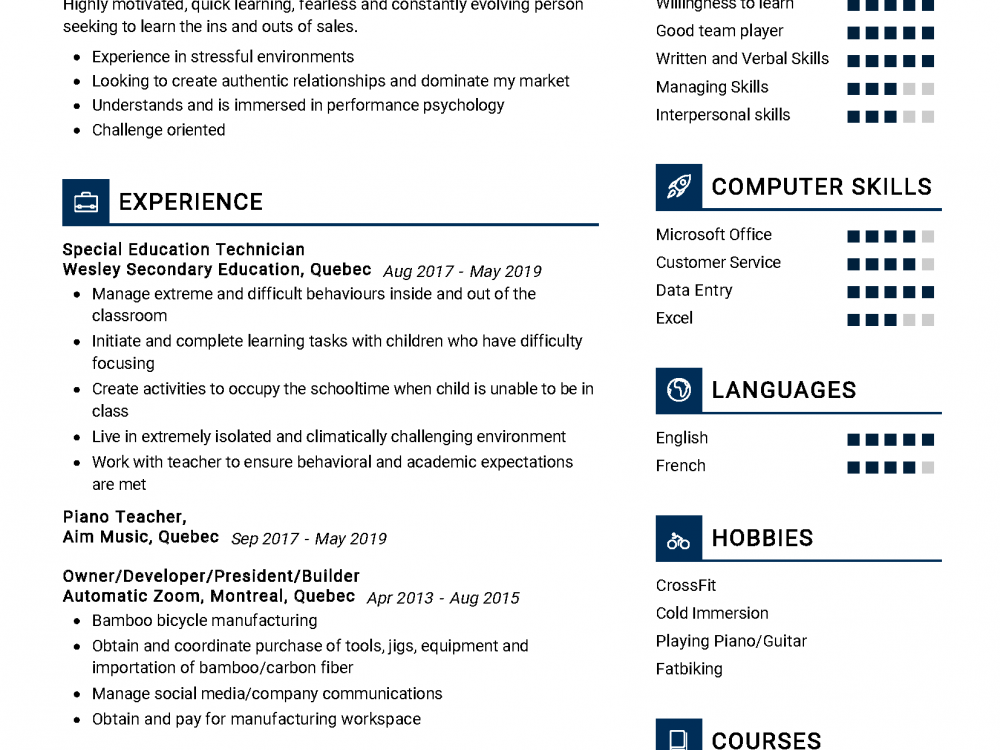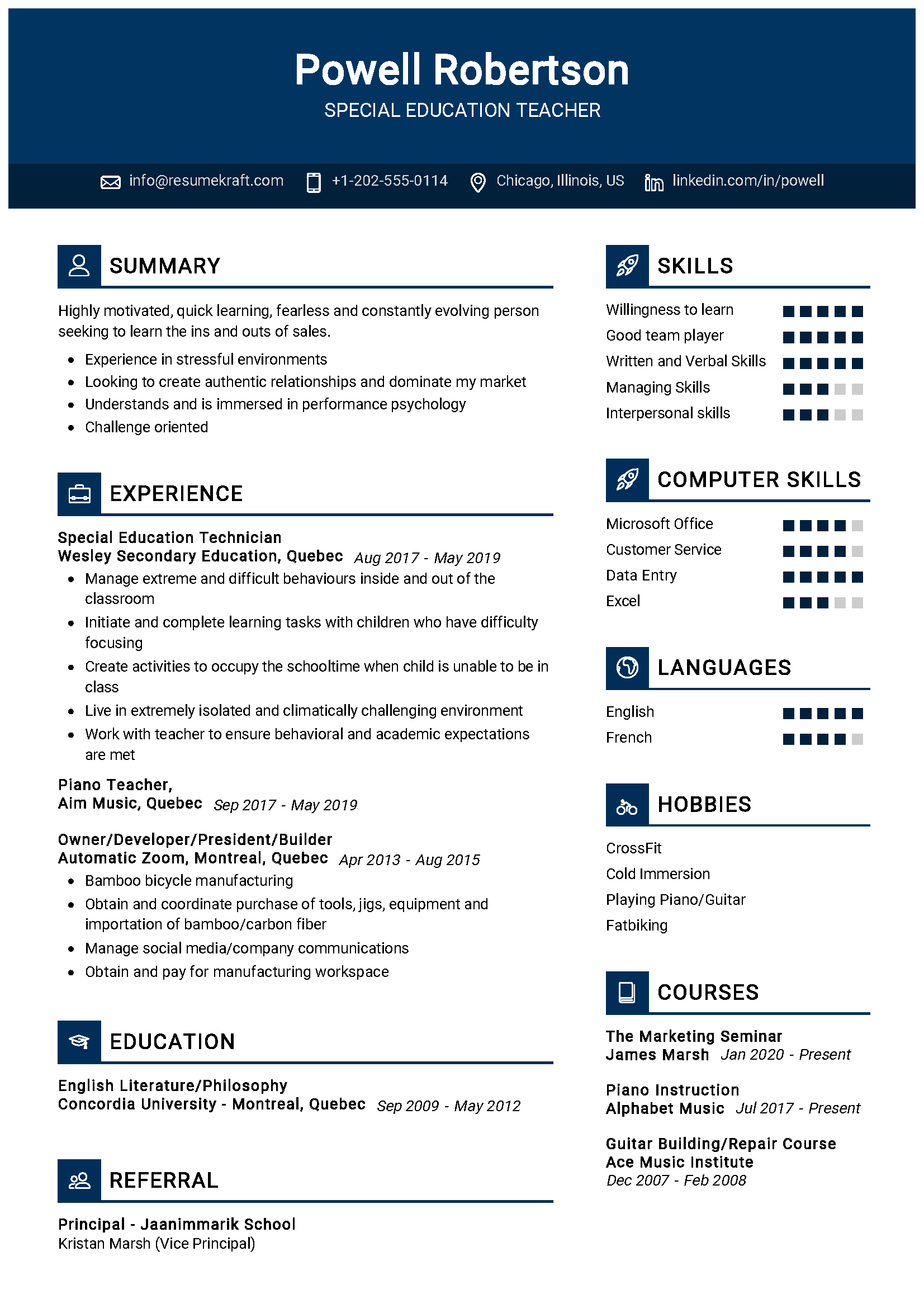Are you a Special Education Teacher by profession and looking for an exciting career? We have good news for you! use our professional Special Education Teacher Resume Sample. You don’t have to start writing from scratch. Just click “Edit Resume” and modify it with your details. Update the template fonts and colors have the best chance of landing your dream job. Find more resume samples.
Special Education Teacher Resume Sample
Powell Robertson
Special Education Teacher
Summary
Highly motivated, quick learning, fearless, and constantly evolving person seeking to learn the ins and outs of sales.
- Experience in stressful environments
- Looking to create authentic relationships and dominate my market
- Understands and is immersed in performance psychology
- Challenge oriented
Skills
Computer Skills
Experience
Special Education Technician
Wesley Secondary Education, Quebec
- Manage extreme and difficult behaviors inside and out of the classroom
- Initiate and complete learning tasks with children who have difficulty focusing
- Create activities to occupy the schooltime when a child is unable to be in class
- Live in an extremely isolated and climatically challenging environment
- Work with the teacher to ensure behavioral and academic expectations are met
Piano Teacher
Aim Music, Quebec
Owner/Developer/President/Builder
Automatic Zoom, Montreal, Quebec
- Bamboo bicycle manufacturing
- Obtain and coordinate the purchase of tools, jigs, equipment, and importation of bamboo/carbon fiber
- Manage social media/company communications
- Obtain and pay for manufacturing workspace
Education
English Literature/Philosophy
Concordia University – Montreal, Quebec
Referral
Principal – Jaanimmarik School
Kristan Marsh (Vice Principal)
(123) 123-3322
Courses
The Marketing Seminar
James Marsh
Piano Instruction
Alphabet Music
Guitar Building/Repair Course
Ace Music Institute
Languages
- French
- English
- German
- Chines
Career Expert Tips:
- Always make sure you choose the perfect resume format to suit your professional experience.
- Ensure that you know how to write a resume in a way that highlights your competencies.
- Check the expert curated popular good CV and resume examples
Special Education Teacher Resume with Writing Guide
Teachers with teaching degrees and special education certifications make some of the most well-educated, skilled teachers in any school district. When looking for a job as an educator, it’s important to make sure your resume is tailored to fit the needs of any position you’re applying for.
Description:
If you’re seeking a job as a special education teacher, it’s important to make sure you have the proper knowledge, skills, and experience to be an effective educator. To find such teaching jobs, it’s also important that you have a properly formatted resume that highlights your skills and experience in a clear and concise way.
TIP: Don’t be afraid to make a resume that stands out. While you want to make sure your resume is filled out completely, you also want it to look clean, professional, and unique. Don’t be afraid to include pictures on a separate page in the back of your resume or use color-coding to distinguish different sections of your CV from each other. If you make a resume that stands out, it will be easier to have your skills and experience noticed by employers.
Special Education Teacher Resume Writing Guide:
1. Begin with a killer introduction.
The first thing people will read is your professional summary, so make sure you’re presenting yourself in the best way possible. Start by writing a brief statement about yourself as an educator and how you can contribute to a school environment. Write about your skills and experience and how they will benefit any school district you’re hoping to work for. You can also state why it is that you are looking for a position as an educator and what you hope to accomplish in the education system.
2. Identify your skills and experience.
Once you’ve written an introduction for your resume, it’s time to start listing out the skills and experience you have that would make you a great educator in any school district. Make sure you are using action verbs while highlighting your successes as a teacher, such as: transformed, assisted, revised, mentored, managed, improved, launched, led.
3. Identify your educational background and certifications.
Many employers, particularly those looking for experienced educators, will request that you include your educational background as well as any certifications and affiliations you have with an educational institution. Make sure you include all of these on your resume so that you can emphasize how much experience you have in the industry.
4. Make sure your resume is up-to-date.
Lastly, carefully review each of your sections and make sure you make the necessary updates. If you have added new certifications to your resume, be sure to update the information. If you have changed jobs since your last resume, be sure to list out that information as well.
Special Education Teacher Responsibilities:
- Teaching assistants help with the instruction of students and provide support in the classroom. They are responsible for creating lesson plans, grading papers, and offering support to teachers as needed.
- Teachers are charged with teaching lessons to students at all levels. From preschool to college, teachers have a vital role in helping students learn material that will be important in their lives both now and later on in life.
- Special education teachers provide instruction to students who require more attention, care, and skill than some of the other students in the school. Special education teachers work with students with learning disabilities, behavioral issues, or those who just need a little extra help.
- Educational technologists work alongside teachers to help implement new technologies in the classroom. They design educational software and create lesson plans that integrate technology into classwork.
- Curriculum coordinators plan and develop educational programs that align with state standards and classroom curricula. They work with teachers to ensure that the curriculum is on track with standards, and they assist in implementing new initiatives.
- Technical consultants work directly with teachers to help develop or implement new curriculum, technology, and instructional material for students. They, as well as other teachers, work closely with these partners to ensure material is being introduced correctly and effectively.
- Reading specialists teach a variety of reading and literacy arts courses. They instruct students in how to read well by analyzing skills and techniques so students can develop those skills themselves.
- School psychologists assess students and their specific learning needs, and they work with educators and parents to determine the most effective methods for teaching certain concepts to students.
- Special education paraprofessionals work directly with students, helping them get through their day, though they don’t have a teacher’s degree or teacher certification. They can help children get started in school by going over the classroom rules and providing basic instruction as needed.
- School counselors give one-on-one instruction to students who need extra support or help working through issues. They can teach students how to manage their emotions and behavior, as well as provide assistance with learning.
- School nurses work with students and parents to ensure healthy children are in school and learning well. School nurses monitor attendance, lead health initiatives, assist students in staying on top of their daily medicine intake, and address student concerns around personal hygiene or physical development
- Community liaisons help parents, community members, and other stakeholders stay involved in the community and its educational system. They work with parents to address any questions or concerns they might have about their student’s education, and they also inform parents of field trips, events, or anything else that is happening in the school community.
Top 10 Special Education Teacher Skills:
- Effective Communicator:
Special education teachers must be able to communicate effectively with parents, students, and fellow teachers about both academic and disability-specific topics. - Positive Attitude:
Teaching is a high-stress job that requires the ability to see the positive in even the toughest of situations. If you have a positive attitude, you’ll be more likely to keep your spirits up and help other students around you stay upbeat, as well. - Flexible:
When working with students of all different learning styles and needs, you must be flexible and adaptable. You can’t learn to teach in a single way, but rather must accept all types of learners and teaching styles. - Excellent Communicator:
To be an effective teacher, you should be able to communicate clearly with your students, their parents or guardians, as well as fellow teachers. This includes being able to effectively explain concepts or ideas that may be difficult for younger students to grasp. - Positive:
While a positive attitude is crucial to being a special education teacher, you must also be able to deal with the ups and downs of teaching. You must be able to remain positive in the face of challenges, setbacks, and negativity from others. - Dependable:
Being dependable is key in the classroom setting as it shows you are reliable and dependable in even the most difficult of situations. Students rely on their teachers to stay focused on their work without being distracted by events beyond their control. - Dedicated:
Being a special education teacher requires a high level of dedication and passion for helping others. In order to best help your students, you must be able to stay focused on their work and needs. - Creative:
Good special education teachers are resourceful, creative problem solvers. They find new ways to tackle problems while also being able to continue with lessons in the event that materials aren’t available or they encounter an issue that keeps them from completing the lesson plan as expected. - Good Listener:
Special education teachers must be good listeners. They must be aware of what their students are saying in order to help them with any frustrations or problems they may have. - Effective Communicator:
Special education teachers must be able to communicate effectively with parents, students, and fellow teachers about both academic and disability-specific topics.
Key Takeaways:
- Tons of different potential careers are available to those who are interested in the education field.
- While many teachers work with a specific subject, there are also teachers who focus on educational topics like technology or community outreach.
- Special education teachers deal with students who have special needs, which could include physical disabilities, mental disabilities, or other issues.
- Special education teachers are often the only ones who teach students how to read and write effectively, since they work on a daily basis with students who may have difficulty learning in these areas.
- Teachers must be dedicated and active in their chosen field, as well as have a strong drive to help others learn and succeed in life.


